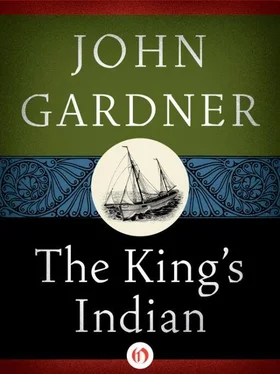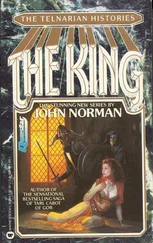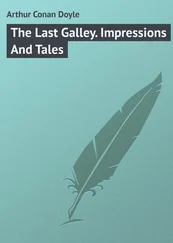“ ‘Ye’ve been listening too much to the grumblers,’ I said.
“He smiled. ‘I’ve been talking to them too, ye know.’
“I said, ‘Captain Dirge knows that?’
“ ‘Everybody knows.’ His smile brought suddenly back to mind his telling me to remember where Nowhere was. I saw that he was there.
“But his story had given me worse than that to worry about. I said, ‘How much did you see of the Captain’s daughter, that night?’
“ ‘Oh, she was there with us most of the time — working in the kitchen. Or it may be she went up to bed for a while. I remember she brought out soup.’
“ ‘That’s all you saw of her — when she brought out soup and when she looked out to make that face at Mr. Knight?’
“ ‘I suppose we saw her two, three times.’
“That was, of course, what I’d been afraid he’d say.
“Mr. Knight said later, gazing straight ahead in the forecastle dimness: ‘I can tell you only this, Mr. Upchurch. That phantom painting should never’ve been believed. Whatever man found it should have burnt it up at once. There are things we’re not meant to think about. The world was created sufficient for our needs. Understand things merely physical— that’s what’s required of us. The questions asked by that hellish Society—’
“ ‘Seems to me,’ I said, ‘that both are mere questions of Natural Mechanics.’
“His jaw worked, the line at the side of his mouth cutting deeper. ‘That’s a risk,’ he said. ‘The assumption that the world’s mechanical— since otherwise it can’t be studied …’ He nodded, stern. ‘That’s a risk. Aye.’
“The ship was grumbling. Billy More stood shaking his head at the sea. ‘Three things will sink us.’ The men sat silent, listening to him.
“The slaves were singing. Strange, darker voices responded from the depths.
“Later that night (that is, what would’ve been night farther north), after I’d gone through her lessons with her, I talked with Augusta on the poopdeck. Her hand laid gently on mine, she said, ‘Jonathan, you couldn’t believe the truth if I told you. I beg you not to ask again. I implore you.’ But I was silent, cool as an iceberg, waiting. The icy breeze had strange scents in it, the smell of fields, though the ship was thousands of miles from living land. Augusta was pale, more chilly than the breeze accounted for. She meant to tell me, I knew by her trembling, though how much of the truth she meant to tell me was any man’s guess. The cold made her more beautiful than ever, her coal-black hair blowing free around her white, white face, the world all around her deathly still. I half expected to hear organ music.
She turned to study me, her eyes just perceptibly widened, her lips slightly parted. It was studied, professional. She drew another deep breath, closed her eyes, and tightened her grip on my hand. ‘Oh, Jonathan,’ she whispered. On the maindeck below us, old Jeremiah gazed blindly up at us; but it was not his listening, the sightless gaze on that bearded, homely face that had drawn that cry from her. Was there any honesty at all in my little entertainer? I wondered. Was the virginal side I thought I’d seen in her merely a measure of her thespian cunning? She drew my hands to the sides of her waist, put her hand on my hips and moved her mittened hands around to the back. So we stood for a moment. Then I took her in my arms, poised, desiring and suspicious, my whole soul teetering, as usual.
“At last, calmly, Augusta said, her voice oddly raised, ‘Jonathan, believe if you can that there is a ship — a ship filled with ghosts — called the Jerusalem.’
“I squinted, waiting.
“ ‘She’s been seen many times, in many places.’ She turned away from me to look at the sea. Then, voice far away, like that of a medium possessed by a child from the kingdom beyond: ‘She’s appeared, off and on, for many years. Always my father, and you and I, and all of us … There’s some tragedy connected with her. There’s a painting— I’m forbidden to show it to you … It’s all that remains from a ship that went down near the Vanishing Isles, the place where a hundred years ago … But the painting … the painting—’ She caught her breath, as if frightened of saying what she’d meant to say. She began to tremble and caught her lower lip with her upper teeth. I held her more closely, eyes averted, to calm her. ‘It was the portrait of a famous theatrical man. A man named Flint.’ She bowed her head. ‘Oh, Jonathan,’ she whispered. She was shaking violently.
“I said, ‘You hung this thing in your room, Augusta? You stared at that horrible fiend every day — and became at last so inured to his evil that you even forgot to hide the picture when I came in to talk, that first afternoon?’
“I felt her muscles tense against me, trembling like fencewire. But she said, ‘I never looked at it, Jonathan. I had no need to. It was burned like a retinal scar into everything I saw. We kept it on the wall in order to learn to live with it, because …’
“At the look of horror that leaped through her features and stiffened every muscle, I spun, still holding her, to look behind me. The Captain stood ten feet from us, a form materialized from nowhere. He merely stood, humpbacked and silent, for all the world like a deadman, staring at his shoes. Despite the violent pounding of my heart, I said, ‘Tell me the rest.’
“ ‘We have come to find him, Jonathan.’
“ ‘But he’s drowned long since! The painting, the ship …’
“Crazily, staring at the motionless old man, her eyes wide, full of what might have been terror and might have been barbarous, rackety glee, Augusta said, ‘We’ve come to find him, to meet him, if possible understand him, understand … everything!
“The smell of land was all around us, solid, real — trees reaching out to us from a thousand miles away, as eerily still as a megalithic door, a blind stone eye against darkness. It made the world heavy. The ship rode low in the water, a great dark casque of murdered whale.
“I asked: ‘How many on the ship know your purpose?’
“ ‘Just the commoners, of course.’
“ ‘And they approve, you think?’
“She was silent a moment, still trembling, her fingers clamped tight to my arms, but the look of both terror and glee was still there. ‘Jonathan, trust me. Trust us —Father and me. Believe in us!’ She tipped her head up as if in conscious imitation of some woodcut figure in a Saint’s Life.
“I said nothing.
“ ’Believe in us!’ A whisper. Her expression — face lifted, eyes rolled down to watch me — was so desperate, so filled with fear that I might not believe, that at last I nodded. Jeremiah had groped nearer.
“The Captain said, ‘Augusta!’
“She made a move to go in with him, then glanced at me, hesitant, and the next instant, as if on a sudden, defiant impulse, kissed me on the lips. When she drew back she was blushing and frightened, on the verge of a swoon. I held her. As she recovered, I released her and she turned away, eyes closed. She moved toward her father slowly, feeble and trembling, as if her fear, her betrayal of us both, had made her ill. She took her father’s arm. Turning slightly, the fingertips of her right hand on her heart, she said, ‘Jonathan, God’s will is inexorable!’
“I stood alone, shaken. The music of the slaves in the hold below was a hum low and steady as the rumble of some animal awakening from centuries of rest. I went back to my quarters, directly to the hiding place in the bulkhead.
“In The World’s Great Scoundrels I found her picture, as I’d known I would — though in the picture she hadn’t dyed her shining, golden hair or transformed her expression to make herself resemble the Captain’s poor gudgeon of a daughter. She was Miranda Flint, offspring of the infamous Dr. Luther Flint, magician, mesmerist, bunkum-man extraordinaire, known from Shanghai to Joplin, Missouri, his birthplace (and Miranda’s), for tricks both benign and malevolent. That was why it had worried old Dirge when he heard, by way of Wilkins, my claim that I’d once been a river-man. Well, I had to hand it to him. Even now that I knew, I could hardly believe that, behind the disguise, he was the incredible Flint.
Читать дальше











![John Bruce - The Lettsomian Lectures on Diseases and Disorders of the Heart and Arteries in Middle and Advanced Life [1900-1901]](/books/749387/john-bruce-the-lettsomian-lectures-on-diseases-and-disorders-of-the-heart-and-arteries-in-middle-and-advanced-life-1900-1901-thumb.webp)
